Gene Tierney @ 100: The Ghost and Mrs. Muir
 Sunday, November 22, 2020 at 8:30PM
Sunday, November 22, 2020 at 8:30PM 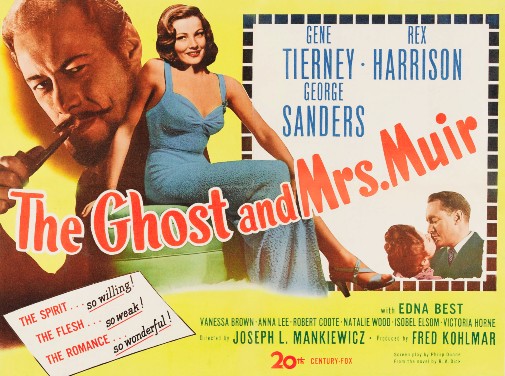
In fiction, love is more powerful and heartfelt when it's impossible. Be it the doomed lovers in Shakespeare's tragedies or Keira Knightley and James McAvoy separated by war and a child's lies in Atonement, we, as spectators, are predisposed to find beauty in the loves that cannot be. Death is a common way to enshrine romance in the perfection of upended passion. Like flowers plucked and dried, kept in the pages of a book, the love that's cut short by the Grim Reaper's blade can preserve its appearance. If it weren't for that, such amorous glories would do like their floral brethren, rotting away with time until dropping into the earth, a mushy decaying mess.
In 1947's The Ghost and Mrs. Muir, starring Rex Harrison and Gene Tierney, this dynamic between love and premature demise is both perpetuated and upended. Death facilitates and limits passion, making it harder to consummate but also more eternal than mundane existence. In Joseph L. Mankiewicz's movie, the transience of life is no obstacle for romance, quite the contrary…
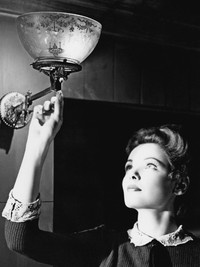 All this fatalistic talk reminds us that these themes have always danced, hand in hand, throughout Gene Tierney's filmography. Thinking of her most famous roles, we have Laura, a living woman made into a spectral ideal, shaped not by reality but by the self-absorbed affections of men. The performance that earned the actress her only Oscar nomination, in Leave Her to Heaven, saw Tierney play a more proactive role in the interlacing of love and death. She's a killer there, a sociopath, one who brings doom upon her husband's life, their romance a sweet cocktail laced with arsenic.
All this fatalistic talk reminds us that these themes have always danced, hand in hand, throughout Gene Tierney's filmography. Thinking of her most famous roles, we have Laura, a living woman made into a spectral ideal, shaped not by reality but by the self-absorbed affections of men. The performance that earned the actress her only Oscar nomination, in Leave Her to Heaven, saw Tierney play a more proactive role in the interlacing of love and death. She's a killer there, a sociopath, one who brings doom upon her husband's life, their romance a sweet cocktail laced with arsenic.
In Laura, Tierney was a ghost, in Leave Her to Heaven, she made ghosts through homicidal madness. In The Ghost and Mrs. Muir, she falls in love with one.
Unlike what that dumbfounding poster might have you believe, this whimsical fantasy is set in 1900, the dawn of the 20th century, when a young widow decides to move out of her relatives' house and get her own home with the meager wealth she has. To the horror of her real-estate agent, the titular Mrs. Muir decides to rent a seaside house by the name of Gull Cottage. Despite its cheap cost and generous size, the abode isn't particularly welcome to the new inhabitants. You see, the house is haunted by its previous owner, the cantankerous Captain Gregg whose embittered anger makes the place shake with ominous dread, the dead man's cackle echoing through its rooms.
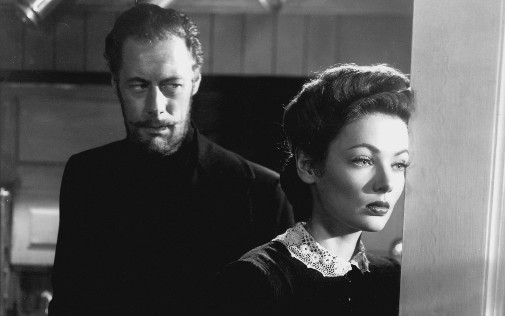
You'd expect Lucy Muir to choose the house despite its haunting, driven by economic despair and a sense of frugality. However, instead of being terrified or even put-off by the ghostly activity, she's almost delighted by it. At first, it appears she's an obstinate skeptic but, after a while, we understand Mrs. Muir is excited by the prospect of sharing her life with the undead. Despite a tinkling, mildly unconvincing, British accent, Gene Tierney brings fascinating energy to her character. Lucy's cheery in the face of despondence, her optimism spiked by stubbornness and her supernatural affiliations brought upon by a genuine sense of adventure, curiosity, and even a bit of sensualist excitement.
If nothing else, Tierney deserves applause for making Rex Harrison into a lover worthy of adoration, a charming Byronic hero whose fate earns our copious tears.
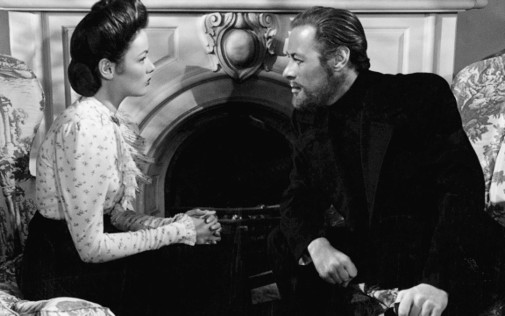
I must confess I wasn't expecting Lucy to be so idiosyncratic when first watching The Ghost and Mrs. Muir. At every turn, the actress and character make choices that surprise and startle, unnerving those who might anticipate dolorous passions or the indifferent wallowing of a damsel in distress. Because of such personable oddities, it's not shocking to see Lucy become accustomed to sharing space with Captain Gregg. Their first face to face interactions drip with pragmatism rather than terror, their budding relationship a kooky union between two headstrong people who recognize a good bit of themselves in the other individual. Primarily, they recognize their lonesomeness, their knowledge of loss.
As the narrative unfolds, tolerance grows into a friendship that grows into professional collaboration before blooming into love. Romance doesn't come instantly to these characters. Instead, it's worked on like a laborious effort that requires equal parts and patience and commitment. Things aren't easy, money is scarce, Natalie Wood's adorable (when is she not?), George Sanders is a mellifluous sleaze (when is he not?), the sea beckons the imagination, and the past builds the road to the future. The material, while high-concept, is treated with sincerity, its earnest feeling drawing humor from the plot without laughing at it, sketching eroticism between characters that can't touch.
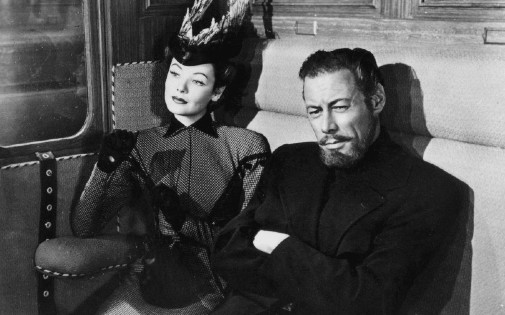
Charles Lang was nominated for an Oscar for the picture's silvery cinematography, the love child between glowing romance and the stark shadows of supernatural tales. The images are suffused with the briny air of the coastline, thick fog doing the part of soft focus, but they transmit warmth, comfort even. The same can be said about the luxurious score by Bernard Herrmann, a collection of melodies that haunt with their sheer beauty. Crafted with exquisite technique, inspiringly performed and charmingly plotted, The Ghost and Mrs. Muir enchants the viewer with a bittersweet spell. From its comedic salvos up to the glorious conclusion, it offers a meditation on pain overcome, regret, lost chances, and the dazzling luminosity of movie stars.
I laughed, I cried, I fell in love with Tierney's lovely Lucia, Harrison's ghostly seaman, and their transcendent affection for one another.
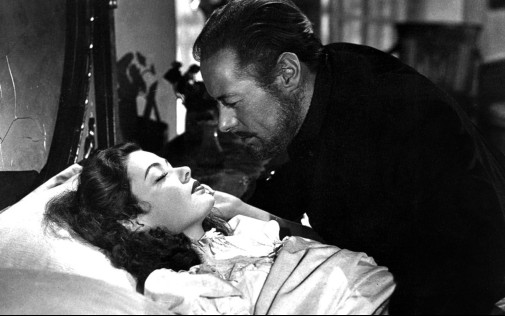
Previously:
- Laura (1944)
- Leave Her to Heaven (1945)



Reader Comments (11)
Speaking of this? As odd/atypical as it would be, I would not be surprised, and definitely curious, if Netflix did this as Season 3 of their The Haunting anthology.
And it was made into a TV series in the late 1960s with Hope Lange, who won two Emmy awards for it. The series must have been regularly repeated in Australia in the late 70s and early 80s because I remember it growing up.
This is one of my partner's favourite movies and I love it too. I'm glad you were so taken with it.
I have a different take on the film.
In 1945, Frank Capra has returned from active duty in Europe. He wanted to make a film that would restore people's lost hope following the Great War. It's A Wonderful Life was a great artistic success and a stunning commercial failure. After such horrific events around the world, the challenge of reintroducing veterans to communities, and the deep bereavement for the loss of so many, audiences simply did not want to see a story of a suicidal man and the apprentice angel sent to aid him.
A year later and attitudes had shifted. Suddenly, movie goers were flocking to stories which featured ghosts, angels and even Santa Claus. The Bishop's Wife addressed a married couple who had grown apart, a not uncommon occurrence for many who were reunited after months and even years of absence. The bishop prays for guidance and receives it from an angel named Dudley. Faith is restored, while the bishop and his wife rekindle their love that had cooled. Miracle on 34th Street addressed Doris Walker, a divorced mother who chooses not to indulge her elementary school age daughter Susan in fantasies like fairy tales and a belief in Santa Claus. The Ghost and Mrs. Muir addressed a grieving widow who seeks to quell her loneliness with the spirit of a sea captain who inhabits an oceanside cottage she occupies with her young daughter.
The headstrong widow with a young daughter rents a haunted cottage on the English seashore. The ghost has driven all previous tenants running, but Mrs. Muir quickly wins the affection of the apparition. The conceit of the fantasy here is that because the romantic pair are a living woman and a ghost, they can never touch.
That leaves the sizeable dilemma of presenting a visual love story in which the lovers never hold one another, kiss, or even join hands. The heat between the deceased Captain Daniel Gregg and the widowed Lucy Muir must be conveyed in gazing into one another’s eyes, heightened emotions that are revealed in verbal exchanges and behaviors.
The sexual tension arises early in the film. Mrs. Muir is undressing for the bed. As she begins to untie a ribbon at her throat and unbutton her blouse, she stops. Wordlessly, she recognizes that the Captain, a spirit, can observe her. She modestly drapes a lap robe over Daniel’s portrait that hangs in her bedroom. The scene shifts and the nightgown attired Mrs. Muir climbs into bed. She sighs and closes her eyes. They quickly pop open and she sits up when we hear the deep manly voice of the ghost who is not seen state, “Never let anyone tell you that you don’t have a fine figure.”
Rex Harrison gives a tremendous performance as Captain Daniel Gregg. The seaman’s death was ruled a suicide. While the skilled sailor blusters that the death was accidental, there is a undertone that leaves the viewer wondering. His physical presence is quite imposing. Harrison speaks with a deep baritone, different than that in his Oscar winning role in My Fair Lady. His barrel chest, finely manscaped facial hair, and resonating voice create an attractive leading man.
The stunningly beautiful Gene Tierney doesn’t shy away from demonstrating a widow’s grief for the loss of a marriage bed. During the course of the story, Mrs. Muir, in addition to her spiritual love affair with the ghost of Captain Gregg, begins a romance with a living, breathing man, a children’s book author. Now the lonely mother must choose between a profound but sexless love or an active sex life with a man she is fond of.
In the immediate period following World War II more women in the audience faced this choice more often than might be acknowledged. The National Institute of Health and US Library of Medicine completed a joint study showing that over 600,000 men returned from the war with various afflictions, both mental and physical, that left the veterans disabled – sexually. Tierney may play the romance quite chastely, but she never allows the audience to doubt what Lucy truly wants or what she will choose. For men in the audience who were suffering such maladies, the film was not a comfort.
Rather, the film in the guise of romantic comedy addressed the grief for absent sexual partners and disabled ones. The Ghost and Mrs. Muir was a landmark film about the emotions addressed by survivors from battle and on the home front after WWII.
And we are left with that romantic image of Mrs. Muir finally clasping the hands of her Captain. He raises up and the two stroll serenely into the afterlife. Love does endure.
Volvgia -- That would be fascinating. Would they take inspiration from the movie, the TV series, or the original novel, I wonder?
Steve G -- I watched it for the first time this year before the '47 Smackdown and was delighted to revisit it. It's such a tonally odd romance, but it enchants me even more on re-watch.
James -- Thank you for sharing such a detailed historical perspective. One film that it reminded me of and which correlates to your thoughts is A GUY NAMED JOE. Though, in that one, the wartime themes are text instead of subtext.
This is a lovely gentle film. I think the best word to describe it is delicate. Everything fits in a delicate balancing act that enables the audience to buy into the movie's premise.
The performances are key but all the other pieces you mentioned come together seamlessly to make it a charmer rather than the clunky misfire it could have been in less deft hands. All that great work and then that awful completely misleading poster! Not only does it have almost zero correlation to the picture they managed to make the ravishing Gene Tierney look misshapen.
Rex is quite magnetic here. I understand what you're saying about the film making him a lover worthy of adoration and how that seems a feat, he always reminded me of a fox ready to snap and the slyness that goes with that (that's not to say that he wasn't a very good actor in both drama and comedy-he was) but he was quite the ladies man off the screen "Sexy Rexy" able to enrapture such beauties as Lilli Palmer and Kay Kendall so there must have been something that didn't quite translate to the screen.
Likewise George Sanders being the mellifluous sleaze which were the parts where he made his greatest impact but having seen a lot of his lesser known films he was often an earnest effective leading man but almost always those roles came in B movies while his silky villainy was reserved for the higher budgeted flicks.
Natalie Wood however was always adorable!
Gene gives a thoughtful performance that suits the role perfectly.
I also remember the Hope Lange TV series that was based on this. Loved it when I was a kid but seeing a couple of episodes in recent years it was just a basic sitcom with a supernatural twist. Hope and Edward Mulhare as the captain are good and the fabulous Reta Shaw as the housekeeper is wonderful as always but it's a standard show with none of the gossamer charm of this film.
The film is enchanting , but I always thought the TV series was a snooze, except for Charles Nelson Reilly. Hope Lange probably won those two Emmys due to her modicum of big screen fame. Her two wins are part of the reason Elizabeth Montgomery, Marlo Thomas and Barbara Feldon were never honored for arguably stronger comedic work on Bewitched, That Girl and Get Smart, respectively. (Not to mention Diahann Carroll's historic performance as Julia, which was as bland as Lange's as Mrs. Muir.)
This is the one film I secretly want to turn into a musical. Don’t tell.
LOVE this one! Handily Harrison's best work ever
I like this movie, but mostly because of Gene Tierney. I feel bad for her character because she's too good for everyone around her, including Rex Harrison's captain. He mostly creeped me out. Not a popular opinion, I know, but honest.
One of my favorites and a beautifully written piece.
I really want to hate this movie, and I can't. It gets me every time! D'oh!